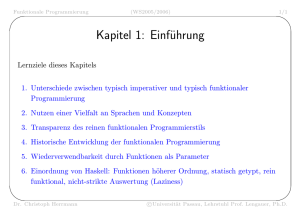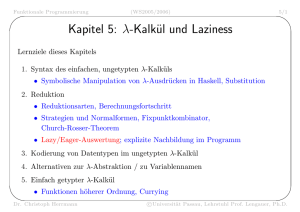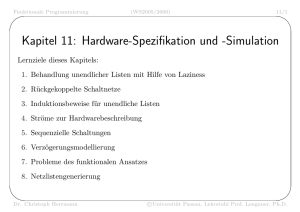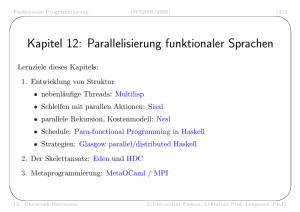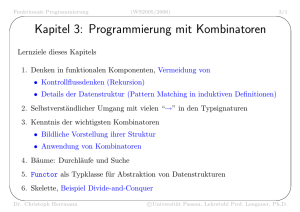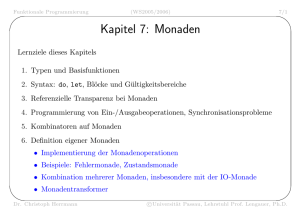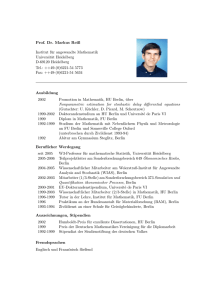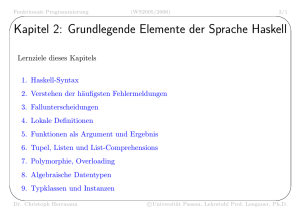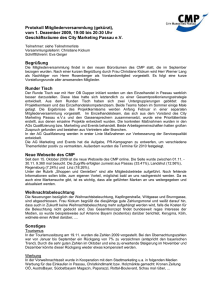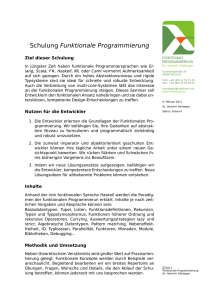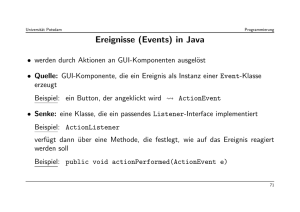Interpretation, abstrakte Interpretation und Typinferenz
Werbung
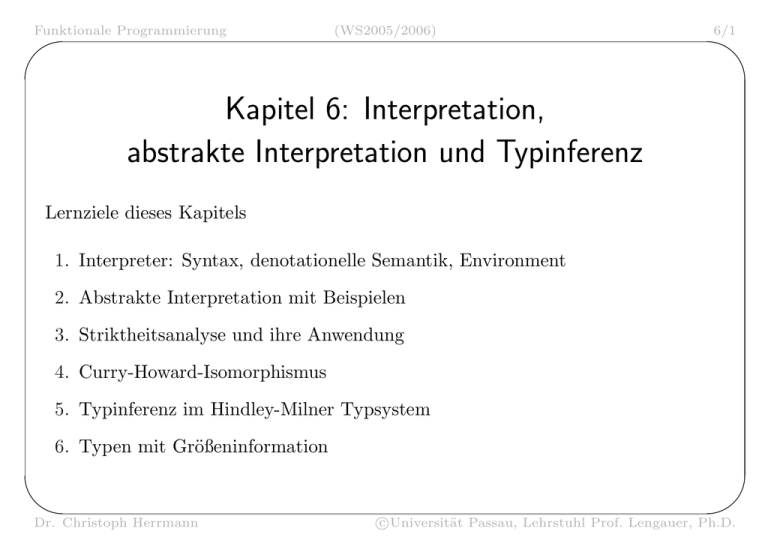
Funktionale Programmierung
'
(WS2005/2006)
6/1
$
Kapitel 6: Interpretation,
abstrakte Interpretation und Typinferenz
Lernziele dieses Kapitels
1. Interpreter: Syntax, denotationelle Semantik, Environment
2. Abstrakte Interpretation mit Beispielen
3. Striktheitsanalyse und ihre Anwendung
4. Curry-Howard-Isomorphismus
5. Typinferenz im Hindley-Milner Typsystem
6. Typen mit Größeninformation
&
Dr. Christoph Herrmann
c
°Universität
Passau, Lehrstuhl Prof. Lengauer, Ph.D.
%
Funktionale Programmierung
'
(WS2005/2006)
6/2
$
Interpretation
• Interpreter :: Syntax → Semantik
– Syntax: Datenstruktur (Syntaxbaum)
– Semantik: Haskell-Funktion: Eingabe → Ausgabe
• abstrakte Interpretation
– reduzierte Semantik: abstrakte Eingabe → abstrakte Ausgabe
– Beispiele
∗ Restklassenarithmetik auf ganzen Zahlen
∗ Striktheitsanalyse
• Typinferenz: kann als abstrakte Interpretation angesehen werden
später in der Vorlesung: stufenweise Interpretation durch Metaprogrammierung
&
Dr. Christoph Herrmann
c
°Universität
Passau, Lehrstuhl Prof. Lengauer, Ph.D.
%
Funktionale Programmierung
'
(WS2005/2006)
6/3
$
Interpreter
1. definiert die denotationelle Semantik eines syntaktischen Ausdrucks
2. transformiert Eingabedaten in Ausgabedaten
empfohlener Aufbau: induktiv definierte Semantikfunktion
• nach dem induktiven Aufbau des Syntaxbaums
• basierend auf Semantik der Teilausdrücke
Behandlung von gebundenen Variablen
• β-Reduktion: (syntaktische) Substitution
• Semantikfunktion: Ablage von Variablenwerten in einem Environment
&
Dr. Christoph Herrmann
c
°Universität
Passau, Lehrstuhl Prof. Lengauer, Ph.D.
%
Funktionale Programmierung
'
(WS2005/2006)
6/4
$
Semantikfunktion für den einfach getypten λ-Kalkül
abstrakte Syntax:
data LExp = V String
| LExp :@: LExp
| L String LExp
-- 1. Variable
-- 2. Applikation
-- 3. Abstraktion
Semantikfunktion S (² Environment):
1. S [[V x]] ² = ² [[x]]
2. S [[f :@: x]] ² = (S [[f ]] ²) (S [[x]] ²)
3. S [[L a v]] ² = λx . (S [[v]] ²0 ),
wobei ²0 [[a]] = x und ²0 [[y]] = ² [[y]] falls y 6= a.
&
Dr. Christoph Herrmann
c
°Universität
Passau, Lehrstuhl Prof. Lengauer, Ph.D.
%
Funktionale Programmierung
'
(WS2005/2006)
6/5
$
Kodierung der Semantikfunktion in Haskell
data Value a = Ground a
| Funct (Value a -> Value a)
-- Grundtyp
-- Funktionstyp
sem :: LExp -> Env (Value a) -> Value a
sem (V x)
env = value env x
-- Nachsehen des Wertes
sem (f :@: x) env = let (Funct h) = sem f env
-- f muss Funktion sein
y
= sem x env
in h y
-- y hier noch nicht ausgewertet
sem (L x v)
env = Funct (\ a -> sem v (addenv (x,a) env))
Lambda> sem ((L "a" (V "f" :@: V "a")) :@: V "b")
(Env [("b",Ground (5::Int)),
("f",Funct (\(Ground x) -> Ground (x*x)))])
25
&
Dr. Christoph Herrmann
c
°Universität
Passau, Lehrstuhl Prof. Lengauer, Ph.D.
%
Funktionale Programmierung
'
(WS2005/2006)
6/6
$
Hilfsfunktionen
newtype Env a = Env { content::[(String,a)] }
value :: Env a -> String ->
value env key = case lookup
Nothing ->
Just x ->
-- Definition Environment
a
-- Wert einer Variablen nachsehen
key (content env) of
error ("unknown value of: " ++ key)
x
instance Show a => Show (Value a) where
show (Ground x) = show x
show (Funct x) = "<function>"
-- Wert anzeigen
-- Neueintrag (Variable,Wert)
addenv :: (String,a) -> Env a -> Env a
addenv x (Env xs) = Env (x:xs)
-- ggfs. Verschattung eines alten Namens
&
Dr. Christoph Herrmann
c
°Universität
Passau, Lehrstuhl Prof. Lengauer, Ph.D.
%
Funktionale Programmierung
'
(WS2005/2006)
6/7
$
Ein Interpreter für einen angereicherten λ-Kalkül
Hinweis: die momentane Form ist unvollständig,
weil die Vervollständigung eine Übungsaufgabe ist
Haskell-Module:
• Syntax: Definitionen der λ-Ausdrücke und Funktionen zur Manipulation von
λ-Ausdrücken
• Reduce: Anwendung von Reduktionsfolgen auf λ-Ausdrücke
• Environment: Abbildung von Namen auf Werte
• Eval: semantische Auswertung durch Abbildung von λ-Ausdrücken auf
Haskell-Ausdrücke
• Main: Test
&
Dr. Christoph Herrmann
c
°Universität
Passau, Lehrstuhl Prof. Lengauer, Ph.D.
%
Funktionale Programmierung
'
(WS2005/2006)
6/8
$
module Syntax(Op(..),LExp(..),substitute) where
import List
infixl 9 :@:
data Op = OAnd | OOr | ONot | OAdd | OSub | OMul | OEq
-- Operatorarten
deriving (Eq,Show)
data LExp
= V String
-- Variable
| CInt Int
-- Int - Konstante
| CBool Bool
-- Bool - Konstante
| LExp :@: LExp
-- Applikation
| L String LExp
-- Abstraktion
| Let (String,LExp) LExp
-- [Let (x,y) e]: let x=y in e
| If LExp LExp LExp
-- [If c t e
]: if c then t else e
| Y LExp
-- Fixpunktoperator
| Prim Op [LExp]
-- vordefinierter Operator
deriving (Show)
&
Dr. Christoph Herrmann
c
°Universität
Passau, Lehrstuhl Prof. Lengauer, Ph.D.
%
Funktionale Programmierung
'
(WS2005/2006)
module Reduce(reduce_WHNF) where
import Syntax
applyPrim :: Op -> [LExp] -> LExp
applyPrim op xs
= case (op,xs) of
(OAnd,[CBool a,CBool b]) -> CBool (a&&b)
...
red_Redex_LMHead :: LExp -> Maybe LExp
red_Redex_LMHead = r where
r (V _)
= Nothing
r ((L v e):@:x) = Just (substitute v x e)
r (f :@: x)
= case r f of
Just e -> Just (e :@: x)
Nothing -> Nothing
r (L _ _)
= Nothing
r (Prim op xs) = case red_Redex_LMHead_Sequence xs of
Nothing -> Just (applyPrim op xs)
Just ys -> Just (Prim op ys)
&
Dr. Christoph Herrmann
6/9
$
...
c
°Universität
Passau, Lehrstuhl Prof. Lengauer, Ph.D.
%
Funktionale Programmierung
'
(WS2005/2006)
6/10
$
reduce_WHNF :: LExp -> [LExp]
reduce_WHNF exp = case red_Redex_LMHead exp of
Nothing
-> [exp]
Just exp’ -> (exp:reduce_WHNF exp’)
red_Redex_LMHead_Sequence
red_Redex_LMHead_Sequence
= let res = foldl (\ acc
Left xs ->
:: [LExp] -> Maybe [LExp]
rs
x -> case acc of
case red_Redex_LMHead x of
Nothing -> Left (xs++[x])
Just x’ -> Right (xs++[x’]) ;
Right xs -> Right (xs++[x]))
(Left [])
rs
in case res of
Left _
-> Nothing
Right ys -> Just ys
&
Dr. Christoph Herrmann
c
°Universität
Passau, Lehrstuhl Prof. Lengauer, Ph.D.
%
Funktionale Programmierung
'
(WS2005/2006)
6/11
$
module Environment(Env,value,addEnv,emptyEnv) where
newtype Env a = E { content::[(String,a)] }
value :: Env a -> String -> a
value env key = case lookup key (content env) of
Nothing -> error "key not found"
Just x -> x
addEnv :: (String,a) -> Env a -> Env a
addEnv x (E xs) = E (x:xs)
emptyEnv :: Env a
emptyEnv = E []
&
Dr. Christoph Herrmann
c
°Universität
Passau, Lehrstuhl Prof. Lengauer, Ph.D.
%
Funktionale Programmierung
'
(WS2005/2006)
6/12
$
module Eval(Domains(..),eval) where
import Syntax
import Environment
data Domains = I Int | B Bool | F (Domains -> Domains)
instance Show Domains where
show (I i) = show i
show (B b) = show b
show (F x) = "<function>"
eval :: LExp -> Env (Domains) -> Domains
eval (V x)
env = value env x
eval (f :@: x) env = let (F h) = eval f env
y
= eval x env
in h y
eval (L x v)
env = F (\ a -> eval v (addEnv (x,a) env))
...
&
Dr. Christoph Herrmann
c
°Universität
Passau, Lehrstuhl Prof. Lengauer, Ph.D.
%
Funktionale Programmierung
'
(WS2005/2006)
6/13
$
module Main where
import Syntax / Eval / Environment / Reduce
{- Das Fixpunktfunktional der Fakultätsfunktion in LExp -}
fpfac :: LExp
fpfac = (L "fac" (L "n"
(If (Prim OEq [V "n",CInt 0])
(CInt 1)
(Prim OMul [V "n",(V "fac") :@: (Prim OSub [V "n",CInt 1])]))))
fac5 :: LExp
fac5 = (Y fpfac) :@: CInt 5
-- Die Fakultät von 5 in LExp
test :: String
test = "Reduktionssemantik: "++show (last (reduce_WHNF fac5))++"\n"
++ "denotationelle Semantik: " ++show (eval fac5 emptyEnv)++"\n"
main = putStr test
&
Dr. Christoph Herrmann
c
°Universität
Passau, Lehrstuhl Prof. Lengauer, Ph.D.
%
Funktionale Programmierung
'
(WS2005/2006)
6/14
$
Verwendung übersetzter Module im ghci
> ghc -c Syntax.hs
> ghc -c Reduce.hs
> ghci Main.hs
...
Loading package base ... linking ... done.
Skipping Syntax
( Syntax.hs, ./Syntax.o )
Skipping Reduce
( Reduce.hs, ./Reduce.o )
Compiling Environment
( Environment.hs, interpreted )
Compiling Eval
( Eval.hs, interpreted )
Compiling Main
( Main.hs, interpreted )
Ok, modules loaded: Main, Eval, Environment, Reduce, Syntax.
*Main> main
Loading package haskell98 ... linking ... done.
Reduktionssemantik: CInt 120
denotationelle Semantik: 120
&
Dr. Christoph Herrmann
c
°Universität
Passau, Lehrstuhl Prof. Lengauer, Ph.D.
%
Funktionale Programmierung
'
(WS2005/2006)
6/15
$
Abstrakte Interpretation
• Prinzip: Auswertung nur unter Berücksichtigung abstrakter Information
• Hauptziel: automatische Programmanalyse
• Beispiele
– Vorzeichenregel für Zahlen
– Restklassenarithmetik
– Striktheitsanalyse
– Datenabhängigkeitsanalyse
– Größenanalyse
– Typinferenz
• Herausforderung: Analyse rekursiver Funktionen (Behandlung von
Fixpunkten)
&
Dr. Christoph Herrmann
c
°Universität
Passau, Lehrstuhl Prof. Lengauer, Ph.D.
%
Funktionale Programmierung
'
(WS2005/2006)
6/16
$
Vorzeichenregel für die Multiplikation
• konkrete Struktur: K̄ = (Z, ∗), abstrakte Struktur: Ā = ({¡, ¯, ¢}, ~)
• Abstraktionsabbildung: a : Z → {¡, ¯, ¢}
¯ , falls x < 0
a x = ¡ , falls x = 0
¢ , falls x > 0
• Abstraktion von ∗: ~ mit
~
¡
¯
¢
¡
¡
¡
¡
¯
¡
¢
¯
¢
¡
¯
¢
• damit gilt: a (x ∗ y) = a x ~ a y
&
Dr. Christoph Herrmann
c
°Universität
Passau, Lehrstuhl Prof. Lengauer, Ph.D.
%
Funktionale Programmierung
'
(WS2005/2006)
6/17
$
Restklassen als abstrakte Information
data Rem10007 = R10007 Int
deriving (Eq,Show)
instance Num Rem10007 where
R10007 x + R10007 y = R10007 ((x+y)
R10007 x - R10007 y = R10007 ((x-y)
R10007 x * R10007 y = R10007 ((x*y)
fromInteger x = R10007 (fromInteger
‘mod‘ 10007)
‘mod‘ 10007)
‘mod‘ 10007)
x ‘mod‘10007)
evalPoly :: Num a => [a] -> a -> a
evalPoly cs x = foldl (\ v c -> x*v+c) 0 cs
*Remainder> evalPoly [1..100000] 2 ‘mod‘ 10007
1006
(42.57 secs, 1593189860 bytes)
*Remainder> evalPoly (map R10007 [1..100000]) (R10007 2)
R10007 1006
(1.77 secs, 25315500 bytes)
&
Dr. Christoph Herrmann
c
°Universität
Passau, Lehrstuhl Prof. Lengauer, Ph.D.
%
Funktionale Programmierung
'
(WS2005/2006)
6/18
$
Übergang zur Potenzmenge (Bsp. Vorzeichenregel)
• Grund: Umgang mit Informationsverlust
• Bsp.: Vorzeichenregel versagt bei Addition
• K̄ = (P(Z), ⊆)
• Ā = ({⊥, ¯, ¡, ¢, >}, v), wobei ∀x : x ∈ A : ⊥ v x und ∀x : x ∈ A : x v >
• Abstraktionsfunktion α : K → A und Konkretisierungsfunktion γ : A → K
⊥
¯
α(X) = ¡
¢
>
&
Dr. Christoph Herrmann
,X = ∅
, ∀x : x ∈ X : x < 0
, X = {0}
, ∀x : x ∈ X : x > 0
, sonst
c
°Universität
Passau, Lehrstuhl Prof. Lengauer, Ph.D.
%
Funktionale Programmierung
'
(WS2005/2006)
6/19
$
Galoisverbindung
∅
{ x ∈ Z | x < 0 }
⊥ ,X = ∅
¯ , ∀x : x ∈ X : x < 0
α(X) =
¡ , X = {0}
¢ , ∀x : x ∈ X : x > 0
> , sonst
γ(M ) =
{0}
{x∈Z|x>0}
Z
,M = ⊥
,M = ¯
,M = ¡
,M = ¢
,M = >
• Galoisverbindung: K ­α
γ A
1. ∀X : X ∈ K : X ⊆ γ(α(X))
2. ∀M : M ∈ A : α(γ(M )) v M
3. α ist monoton
4. γ ist monoton
• es gilt: α ◦ γ ◦ α = α und γ ◦ α ◦ γ = γ
&
Dr. Christoph Herrmann
c
°Universität
Passau, Lehrstuhl Prof. Lengauer, Ph.D.
%
Funktionale Programmierung
'
(WS2005/2006)
6/20
$
Striktheitsanalyse (vorwärts)
• Ziel: in welchen Argumenten ist eine Funktion strikt?
• abstrakte Wertemenge {⊥, >} mit der Ordnung ⊥ v >
⊥ : konkreter Wert ist garantiert undefiniert
> : keine Information vorhanden
• α] (f ): abstrakte Funktion zu f
½
⊥
]
α (if then else )(z, x, y) =
xty
¾
, falls z = ⊥
, falls z = >
= z u (x t y)
• andere Grundfunktionen sind strikt: α] (f )(x0 , ..., xn ) = ui : 0 ≤ i ≤ n : xi
• eine Funktion f ist strikt in Argument i, falls
xi = ⊥ ∧ (∀j : j 6= i : xj = >) =⇒ α] (f )(x0 , ..., xn ) = ⊥
• Funktionale stetig und Verband über {⊥, >}n endlich: rekursive Funktion mit
n Argumenten kann (mit maximal n Approximationen á 2n abstrakten
Auswertungen) analysiert werden
&
Dr. Christoph Herrmann
c
°Universität
Passau, Lehrstuhl Prof. Lengauer, Ph.D.
%
Funktionale Programmierung
'
(WS2005/2006)
6/21
$
Bedeutung der Striktheitsanalyse
Compiler-Optimierung für nicht-strikte Sprachen:
call-by-value ist effizienter, falls Wert gebraucht wird
1. Analyse: bestimme für alle Funktionen die strikten Argumente
2. Codeerzeugung:
• Aufruf: Auswertung der strikten Argumente vor Aufruf
• Verwendung: beim Zugriff kein Test, ob Auswertung nötig
&
Dr. Christoph Herrmann
c
°Universität
Passau, Lehrstuhl Prof. Lengauer, Ph.D.
%
Funktionale Programmierung
'
(WS2005/2006)
6/22
$
Beispiel
• konkrete Funktion: f (x,y) = if p x then c else f (g (x,y), y)
• abstrakte Funktion: f ] (x, y) = x u (> t f ] (x u y, y))
• Fixpunktiteration
(⊥, ⊥)
(⊥, >)
(>, ⊥)
(>, >)
0
⊥
⊥
⊥
⊥
1
⊥
⊥
>
>
2
⊥
⊥
>
>
Fixpunkt erreicht
• Interpretation des Ergebnisses
– f (⊥, >) = ⊥: f ist strikt im ersten Argument
– f (>, ⊥) = >: man kann nicht sagen, ob f im zweiten Argument strikt ist
&
Dr. Christoph Herrmann
c
°Universität
Passau, Lehrstuhl Prof. Lengauer, Ph.D.
%
Funktionale Programmierung
'
(WS2005/2006)
6/23
$
Curry-Howard-Isomorphismus
Logik zwischen Programmen und ihren Typen
“Formulae as types and proofs as terms”
Bsp.: Modus-Ponens-Regel
Typregel der Applikation
P ⇒Q|P
Q
f :: α → β | x :: α
f x :: β
Gedankliche Verbindung:
• x ist ein Beweis für α
• f konstruiert einen Beweis für β unter Voraussetzung α
• f x ist ein Beweis für β
&
Dr. Christoph Herrmann
c
°Universität
Passau, Lehrstuhl Prof. Lengauer, Ph.D.
%
Funktionale Programmierung
'
(WS2005/2006)
6/24
$
Curry-Howard-Isomorphismus, logische Operatoren
Formel
Typ
false
Void
leerer Typ
a∧b
(a,b)
Produkttyp
a∨b
Either a b
Summentyp
a⇒b
a->b
Funktionstyp
true
()
Unit-Typ
Bsp.: a ∧ b ⇒ a ∨ b
type Theorem = forall a b. (a,b) -> Either a b
proof :: Theorem
proof (x,y) = Left x
&
Dr. Christoph Herrmann
c
°Universität
Passau, Lehrstuhl Prof. Lengauer, Ph.D.
%
Funktionale Programmierung
'
(WS2005/2006)
6/25
$
Typinferenz als abstrakte Interpretation
• Typinformation der Applikation
f :: α → β | x :: α0
f x :: β 0
wobei β 0 = σ(β), σ = mgu(α, α0 ), most general unifier (Substitution)
Bsp.: f :: γ → γ, x :: (Int → Int), σ = [γ := Int → Int]
• Spezialisierung: α t α0 = σ(α) = σ(α0 )
• Typvariable entspricht ⊥ (nicht-definierter Typ)
• Typfehler entspricht >
&
Dr. Christoph Herrmann
c
°Universität
Passau, Lehrstuhl Prof. Lengauer, Ph.D.
%
Funktionale Programmierung
'
(WS2005/2006)
6/26
$
Hindley-Milner Typsystem (1)
&
Variablen
A ] {x :: τ } ` x :: τ
Bedingungen
A ` c :: Bool | A ` e1 :: τ | A ` e2 :: τ
A ` (if c then e1 else e2 ) :: τ
Abstraktionen
A ] (x :: σ) ` e :: τ
A ` (\ x -> e) :: (σ → τ )
Applikationen
A ` f :: (σ → τ ) | A ` x :: σ
A ` (f x) :: τ
Dr. Christoph Herrmann
c
°Universität
Passau, Lehrstuhl Prof. Lengauer, Ph.D.
%
Funktionale Programmierung
'
(WS2005/2006)
6/27
$
Hindley-Milner Typsystem (2)
&
let-Ausdrücke
A ` y :: σ | A ] {x :: σ} ` e :: τ
A ` (let x = y in e) :: τ
Fixpunkt
A ] {x :: τ } ` e :: τ
A ` (Y (\ x -> e)) :: τ
Generalisierung
A ` e :: τ
(α nicht frei in A)
A ` e :: ∀α.τ
Spezialisierung
A ` e :: ∀α.τ
A ` e :: (τ [α := σ])
Dr. Christoph Herrmann
c
°Universität
Passau, Lehrstuhl Prof. Lengauer, Ph.D.
%
Funktionale Programmierung
'
(WS2005/2006)
6/28
$
Bsp.: Typinferenz der map-Funktion (1)
map’ = Y h where
h = \ map f xs
-> if null xs
then []
else f (head xs) : map f (tail xs)
xs :: τ1 | null :: [τ2 ] → Bool
{τ1 = [τ2 ]}
null xs :: Bool
xs :: [τ2 ] | head :: [τ3 ] → τ3
{τ3 = τ2 }
head xs :: τ2
f :: τ4 | head xs :: τ2
{τ4 = τ2 → τ5 }
f (head xs) :: τ5
&
Dr. Christoph Herrmann
c
°Universität
Passau, Lehrstuhl Prof. Lengauer, Ph.D.
%
Funktionale Programmierung
'
(WS2005/2006)
6/29
$
Typinferenz der map-Funktion (2)
xs :: [τ2 ] | tail :: [τ6 ] → [τ6 ]
{τ6 = τ2 }
tail xs :: [τ2 ]
map :: τ7 | f :: τ2 → τ5
{τ7 = (τ2 → τ5 ) → τ8 }
map f :: τ8
map f :: τ8 | tail xs :: [τ2 ]
{τ8 = [τ2 ] → τ9 }
map f (tail xs) :: τ9
(:) :: τ10 → [τ10 ] → [τ10 ] | f (head xs) :: τ5
{τ10 = τ5 }
(:) (f (head xs)) :: [τ5 ] → [τ5 ]
(:)(f (head xs)) :: [τ5 ] → [τ5 ] | map f (tail xs) :: τ9
{τ9 = [τ5 ]}
f (head xs) : map f (tail xs) :: [τ5 ]
&
Dr. Christoph Herrmann
c
°Universität
Passau, Lehrstuhl Prof. Lengauer, Ph.D.
%
Funktionale Programmierung
'
(WS2005/2006)
6/30
$
Typinferenz der map-Funktion (3)
null xs :: Bool
| [] :: [τ11 ]
| f (head xs) : map f (tail xs) :: [τ5 ]
if null xs
{τ11 = τ5 }
then []
else f (head xs) : map f (tail xs)
:: [τ5 ]
&
Dr. Christoph Herrmann
c
°Universität
Passau, Lehrstuhl Prof. Lengauer, Ph.D.
%
Funktionale Programmierung
'
(WS2005/2006)
6/31
$
Typinferenz der map-Funktion (4)
Abkürzung: h = \ map -> R0 , wobei R0 = \ f xs -> R
R :: [τ5 ] | xs :: [τ2 ]
(\ xs -> R) :: [τ2 ] → [τ5 ]
f :: τ2 → τ5 | (\ xs -> R) :: [τ2 ] → [τ5 ]
{σ = (τ2 → τ5 ) → [τ2 ] → [τ5 ]}
(\ f xs -> R) :: σ
map :: σ | R0 :: σ
(Y (\ map -> R0 )) :: σ
Ergebnis:
&
map :: ∀ α β . (α → β) → [α] → [β]
Dr. Christoph Herrmann
c
°Universität
Passau, Lehrstuhl Prof. Lengauer, Ph.D.
%
Funktionale Programmierung
'
(WS2005/2006)
6/32
$
Generische Typvariablen
• Nicht typisierbar im Hindley-Milner System:
(\f -> (f 3, f True)) id
– Grund: f :: (α → α), aber α kann nicht gleichzeitig den Typ Integer und
Bool haben
– Monomorphismus-Restriktion von λ-Abstraktionen
• Typisierbar: let f = id in (f 3, f True)
– Grund: f :: ∀α.(α → α)
– α ist eine generische Typvariable
• Nicht typisierbar: (\g -> let f = g in (f 3, f True)) id
– Grund: ∀α wird aufgelöst durch λ-Bindung von g
&
Dr. Christoph Herrmann
c
°Universität
Passau, Lehrstuhl Prof. Lengauer, Ph.D.
%
Funktionale Programmierung
'
(WS2005/2006)
6/33
$
Milners W-Algorithmus [Milner, 1978]
• Zuweisung eines eindeutigen, allgemeinsten Typs zu jedem korrekten
syntaktischen (ML-)Ausdruck oder Meldung eines Typfehlers.
• Der W-Algorithmus terminiert immer; Typinferenz ist berechenbar (im
Ggs. zu der für best. Haskell-Erweiterungen).
• Nur Berechnung von shallow types, d.h., keine (All-)Quantoren innerhalb von
Typausdrücken (Monomorphismus-Restriktion).
• Lösung von Typgleichungen durch Unifikation mit dem Robinson-Algorithmus
[Robinson, 1965]; berechnen des allgemeinsten Unifikators (Substitution).
• Unlösbarkeit von α = α → α mit endlichen Termen Grund für das Scheitern
der Typinferenz von (x x) in W (die Regeln des Hindley-Milner Systems
würden das zulassen).
&
Dr. Christoph Herrmann
c
°Universität
Passau, Lehrstuhl Prof. Lengauer, Ph.D.
%
Funktionale Programmierung
'
(WS2005/2006)
6/34
$
Unifikation
Kompakte Sicht: Kalkül von Martelli u. Montanari [1982]
Γ ] {ϕ(τ1 ,...,τn )=ϕ(τ10 ,...,τn0 )}
1. Dekomposition:
(auch für n = 0)
Γ ∪ {τ1 =τ10 ,...,τn =τn0 }
Γ ] {ν=τ }
2. Variablen-Elimination: Γ[ν:=τ ] , falls ν in τ nicht vorkommt
(Occurs-Check), dabei Aktualisierung der Substitution durch:
σ 0 = σ[ν := τ ] ∪ {ν := τ }
Γ ] {τ =ν}
3. Umordnung: Γ ∪ {ν=τ } , falls τ keine Variable ist
Γ ] {ν=ν}
4. Elimination trivialer Gleichungen:
Γ
&
Dr. Christoph Herrmann
c
°Universität
Passau, Lehrstuhl Prof. Lengauer, Ph.D.
%
Funktionale Programmierung
'
(WS2005/2006)
6/35
$
Anreicherung von Typen mit Größeninformation
• Beispiel: zwei Listen sollen nur dann den gleichen Typ haben, wenn sie auch
die gleiche Länge haben
• Zweck: bestimmte Laufzeitfehler sollen als Typfehler erkannt werden
• nur für bestimmte Probleme sinnvoll
• erster Ansatz (nicht optimal, monomorph)
data N
= N
data C t = C Int t
-- t: Restliste
• erwünschtes Element: C 3 (C 1 (C 2 N)) :: C (C (C N))
• unerwünscht: (C 1 "Haha") :: C [Char]
&
Dr. Christoph Herrmann
c
°Universität
Passau, Lehrstuhl Prof. Lengauer, Ph.D.
%
Funktionale Programmierung
'
(WS2005/2006)
6/36
$
Typfehler statt Laufzeitfehler
hd :: C t -> Int
hd (C x _) = x
tl :: C t -> t
tl (C _ y) = y
Beispiele:
• tl (tl (C 1 (C 2 (C 3 N)))) Ã C 3 N
• hd (tl (C 3 N)) Ã
Couldn’t match ‘C t’ against ‘N’
Expected type: C t
Inferred type: N
&
Dr. Christoph Herrmann
c
°Universität
Passau, Lehrstuhl Prof. Lengauer, Ph.D.
%
Funktionale Programmierung
'
(WS2005/2006)
6/37
$
Überladung von Funktionen
class List a where
len
::
a
-> Int
mapL :: (Int -> Int)
-> a
-> a
zipW :: (Int->Int->Int)
-> a -> a -> a
foldL :: (b -> Int -> b) -> b -> a
-> b
instance List N where
len
N
= 0
mapL f
N
= N
zipW f
N N = N
foldL f e N
= e
instance List t => List (C t) where
len
(C _ s)
= 1 + len s
mapL f
(C x s)
= C (f x)
(mapL f s)
zipW f
(C x s) (C y t) = C (f x y) (zipW f s t)
foldL f e (C x s)
= foldL f (f e x) s
&
Dr. Christoph Herrmann
c
°Universität
Passau, Lehrstuhl Prof. Lengauer, Ph.D.
%
Funktionale Programmierung
'
(WS2005/2006)
6/38
$
Sortieren
class List a where
...
insert :: Int -> a -> C
sort
::
a ->
instance List N where
...
insert x N
= C x N
sort
N
= N
instance List t => List (C
...
insert x (C y s) | x<=y
| x> y
sort (C x s) = insert x
&
Dr. Christoph Herrmann
a
a
-- Beweis, dass sort Länge erhält!
t) where
= C x (C y s)
= C y (insert x s)
(sort s)
c
°Universität
Passau, Lehrstuhl Prof. Lengauer, Ph.D.
%
Funktionale Programmierung
'
(WS2005/2006)
6/39
$
Verbesserung
• Verlust an Polymorphie
– Lösung 1: Verzicht auf Typgleichheit der Elemente, unakzeptabel
– Lösung 2: zusätzlicher Typparameter (gewählte Alternative): C t a
• unerwünschte Elemente, z.B.: (C 1 "Haha") :: C [Char]
– Typklassenkontext List t in der Definition des Datentyps C t a und nur
N und C t werden als Instanzen von List t deklariert.
• Datentypdefinition
data
N
a = N
data List t => C t a = C { hd :: a, tl :: t a }
• ghc-Flags -fglasgow-exts -fallow-undecidable-instances verwenden
&
Dr. Christoph Herrmann
c
°Universität
Passau, Lehrstuhl Prof. Lengauer, Ph.D.
%
Funktionale Programmierung
'
(WS2005/2006)
6/40
$
Zweiter Ansatz (1)
data
N
a = N
data List t => C t a = C { hd :: a, tl :: t a }
class List t where
len
:: t a -> Int
zipW
:: (a->b->c) -> t a -> t b -> t c
...
instance List N where
len N = 0
zipW f N N = N
...
instance List t => List (C t) where
len (C _ s) = 1 + len s
zipW f (C x s) (C y t) = C (f x y) (zipW f s t)
...
&
Dr. Christoph Herrmann
c
°Universität
Passau, Lehrstuhl Prof. Lengauer, Ph.D.
%
Funktionale Programmierung
'
(WS2005/2006)
6/41
$
Zweiter Ansatz (2)
Da nun Polymorphie möglich ist, wird statt mapL die bekannte Funktion fmap in
entsprechenden Instanzdefinitionen von Functor definiert:
data N a
= N
data List t => C t a = C { hd :: a, tl :: t a }
instance Functor N where
fmap f N = N
instance (List t, Functor t) => Functor (C t) where
fmap f (C x xs) = C (f x) (fmap f xs)
&
Dr. Christoph Herrmann
c
°Universität
Passau, Lehrstuhl Prof. Lengauer, Ph.D.
%
Funktionale Programmierung
'
(WS2005/2006)
6/42
$
Zweiter Ansatz (3)
Bei der polymorphen Variante: nur die Typen ändern sich, die Implementierung
des ersten Ansatzes bleibt.
data N a
= N
data List t => C t a = C { hd :: a, tl :: t a }
class List t
len
::
zipW
::
foldL ::
insert ::
sort
::
&
where
t a -> Int
(a->b->c) -> t a -> t b -> t c
(a->b->a) -> a -> t b -> a
Ord a => a -> t a -> C t a
Ord a => t a -> t a
Dr. Christoph Herrmann
c
°Universität
Passau, Lehrstuhl Prof. Lengauer, Ph.D.
%
Funktionale Programmierung
'
(WS2005/2006)
6/43
$
Typen mit Größeninformation, Fazit
• Möglichkeiten
– Beweis von Programmeigenschaften im Typ
– Kontrolle über Speicherbedarf, Rechenzeit
• Praktische Probleme
– Einschränkung der Programmiermöglichkeiten
∗ Insertion Sort: möglich, aber buchhalterischer Umgang mit Anzahlen
∗ Quicksort: nicht möglich, weil Anzahlen erst zur Laufzeit feststehen
– Keine Standardbibliotheken verwendbar
• Theoretische Grenzen
bei unbekannten Anzahlen
– Addition möglich (“=” entscheidbar in der Presburger Arithmetik)
– Multiplikation nicht möglich (“=” unentscheidbar in der Zahlentheorie)
&
Dr. Christoph Herrmann
c
°Universität
Passau, Lehrstuhl Prof. Lengauer, Ph.D.
%
